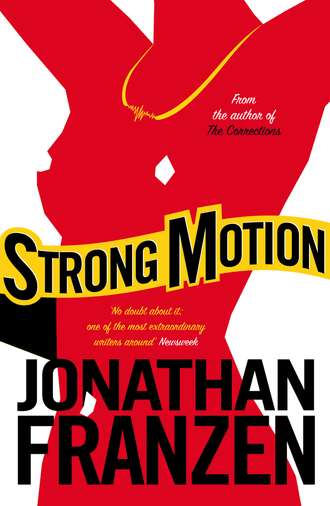
Полная версия
Strong Motion
“Yeah.”
She became even more tentative. “You like your job?”
“Too early to say.”
“Would you give Peter a chance, Louis? He comes on a little arrogant but he’s very vulnerable underneath.”
“Which reminds me,” Louis said. “He got a phone call while you were out. I was like, Grandmother? Grandmother who?”
“Oh. Rita. She tried to get me to call her Grandmother too.”
“It slipped my mind that she existed.”
“That’s because she and Mom are like—agggggh.” Eileen started strangling herself with both hands. “Do you know anything about this?”
“You know when the last time I had a real conversation with Mom was? Ferguson Jenkins was on the Cubs’ roster.”
“Well, but apparently Grandpa made a whole lot of money at some point, and when he died he didn’t leave anything at all to Mom or Aunt Heidi, because he was married to Rita. Rita got everything.”
“Definitely not the way to Mom’s heart.”
“Except Peter says Rita didn’t really get anything either. It’s all in a trust fund.”
“What’s Peter know about this?”
“He was Rita’s publicist. That’s how I met him.” Eileen hopped up and went to her bookshelf. “Rita turned New Agey after Grandpa died. She’s got a pyramid on the roof of the house. She keeps her wine in the barn because she thinks it won’t mature under the pyramid. This is her new book.” She handed Louis a thin, hot-pink volume. “She has them printed by some pretend publisher in Worcester, and they all come in one shipment, on these huge flats. Last time I was at her house she had them all in the barn, with the wine. Just this massive wall of books. That’s what she needs a publicist for, and for her lectures too. But listen, do you want tortellini with red sauce or linguine with white clam sauce?”
“Whichever’s easier.”
“Well, they’re both in bags.”
“Tortellini,” Louis said. The title of the hot-pink book was Princess Itaray: An Atlantean Case History. On the title page the author had written: To Eileen, my little doll, with love from Grandmother. Louis paged through the book, which was divided into chapters and subchapters and sub-subchapters with boldface numbered headings:
4.1.8 Implications of the Disappearance of the Dime-sian Appendage: A Reversible Fall from Eden?’
He looked at the flap copy. In this fanciful yet erudite work, Dr. Kernaghan advances the hypothesis that the cornerstone of Atlantean society was the universal gratification of sexual desire, and proposes that the human appendix, now a vestigial organ, was, among the Atlanteans, both external and highly functional. With the hypnotic regression of a 14-year-old schoolgirl, Mary M— of Beverly, Massachusetts, Dr. Kernaghan embarks on a compelling exploration of Atlantean deep psychology, the historical origins of repressed sexuality, and the modern world’s potential for a return to a golden age …
“She’s written two other books too,” Eileen said.
“She’s a doctor?”
“Some honorary degree. Milton Friedman thinks it’s the silliest thing he’s ever heard of, isn’t that right, Milton Friedman? Peter helped her a lot—got her on the radio and on TV a couple times. He has all kinds of connections and he’s only in it part-time. Eventually he had to tell her to get somebody else, though. For one thing she drinks an awful lot. She also talks about Grandpa like he’s alive and talks to her all the time. You don’t know whether you’re supposed to laugh or not.”
Louis didn’t mention that he’d made a date for drinks with this woman.
“But anyway, that’s how I met Peter. She’s got a beautiful estate, you probably don’t remember it. We stayed there for a week or something when we were litle. You remember?”
Louis shook his head.
“Neither do I, really. Rita wasn’t on the scene yet. I mean, she was still Grandpa’s secretary. Sometimes I wonder what we’d think of him if he was still alive.”
For the rest of the evening Louis sat in various chairs and Eileen orbited. A plate of food was something towards which she showed no particular sense of responsibility; she left the table and came back; her food was at her mercy. When Louis put his coat on to leave, she awkwardly patted his arm and, still more awkwardly, embraced him. “Take care of yourself, huh?”
He tore himself away. “What do you mean take care of myself? Where do you think I’m going? I’m going two and a half miles.”
She kept her hand on his shoulder until he was out the door. Moments later, as she turned the news on, there was a knock. Louis was standing in the hall, businesslike, looking aside with a frown. “I just remembered something,” he said. “I just remembered the place in Ipswich, Mom’s father’s place. We threw rocks—”
“Oh!” Eileen’s face lit up. “At the horses.”
“We threw rocks at the horses—”
“To save them!”
“To save them from dying. So you remember too. We thought they’d die if they stood still.”
“Yes.”
“That was all.” His round shoulders turned away from her. “See you later.”
In high school Louis had never become so disaffected that he apologized for loving radio. Radio was like a crippled pet or retarded sibling that he always made time for and didn’t mind— didn’t even notice—if people laughed at. When Eileen saw him out walking in distant wastelands he was generally in transit to or from an airconditioned and empty electronics-supply store in some weedy plaza where the only other going concern was a Chinese restaurant in the last of its nine lives, and maybe a depopulated pet store. From the wall of prepackaged ICs and RF connectors and micropots and gator clips and jumpers and variable capacitors he selected components from the top of his wish list and added up the prices in his head, guessing on the sales tax, and handed them to the sad mustached man who preferred to sell stereo systems, and paid for them with the small bills that neighbors had given him for doing low-caste work: wall-washing; brush-clearing; dog-related services. He was ten when he got a crystal diode set, twelve when he built his HeathKit shortwave radio, fourteen when he became WC9HDD, and sixteen when he got his general license. Radio was his thing, his interest. A kid derives a satisfaction that rivals sex or maybe instead connects with it along obscure mental byways when he puts together a few simple metal and ceramic objects—objects he knows to be simple because he has experimentally destroyed many of them with screwdriver and pliers— and connects them to a battery and hears distant voices in his bedroom. There were stray resistors on his bedspread, resistors whose color coding he’d known by heart a year before he learned about sperm and eggs, the afternoon he lost his virginity. “Ouch, what is this?” (It was a 220-ohm metal-film resistor with a gold tolerance band.) Louis also happened to be one of the few ham operators in greater Chicago willing to speak or encode in French, and so when the sunspots were heavy he could be kept busy half the night trading temperature readings and autobiographical data with operators in all the snowed-in corners of Quebec. Which didn’t make him talkative in French class, only bored, since anything he did really well he kept hidden.
He entered Rice University as a prospective double-? major and left it with a degree in French, having in the meantime managed KTRU, the campus station, for three semesters. A week after graduation he went to work for a local C&W station, attending to relatively attractive duties for the abrupt abandoning of which after only eight months he would give no more satisfactory account to Eileen than the question: “Why does anybody quit a job?”
The studios of WSNE, his new employer, were in the western suburb of Waltham, in an office building overlooking one corner of the forty acres devoted to the intersection of Route 128 (“America’s Technology Region”) and the Mass Pike. Louis’s job title was board operator, a peonic position that involved operating the cartridge player, cuing up records, and backtiming the AP network news, but he did this only from six to ten in the morning, because only the morning drive announcer, Dan Drexel, was considered irreplaceable enough to rate his own operator. Louis understood that the remainder of his workday, which ended at 3 p.m., was to be spent on exciting tasks like entering traffic data on a keyboard, transferring agency commercials from reel to cart, writing PSAs, and grading the contest entries with which the station’s dwindling listenership sought to win various worthless gifts. He understood that he would be paid the federal minimum wage.
One reason he had had little competition for the job was that WSNE’s bid for license renewal in June was expected not to be routine. Paychecks were issued with precise instructions about when and when not to attempt to cash them. The insatiable payroll had gotten into the main production studio and torn out the sound equipment and acoustical panels and everything else with resale value, leaving ragged empty rectangles with exposed particle board in the Formica consoles, and butterscotch-colored glue spots on the walls. A new FM college station had bought all of WSNE’s record collection except the juvenile section (the Care Bears’ entire LP oeuvre; the Muppets; the original Disney sound track of Winniethe-Pooh; the Flintstones doing times tables) and the comedy recordings. The grooves of the latter were rapidly being worn smooth by WSNE’s morning News with a Twist programming, which interlarded news and comment with “the funniest routines of all time.”
A man named Alec Bressler owned and operated WSNE. Alec was a Russian émigré of German extraction who in the mid-sixties had allegedly paddled from Kaliningrad to Sweden in a rubber dinghy. The only official duty he gave himself was to tape the daily broadcast editorial, but he was always hovering in the studios, observing with immense satisfaction that electricity was flowing through all the necessary circuits, that this station that belonged to him was actually functioning and transmitting his chosen programs. He was a moderately paunchy fifty, with East-bloc hair, devalued somehow and slow to grow, and skin grayed by a cigarette habit he resisted only to the extent of addicting himself to nicotine lozenges as well. He dressed in thin sweaters and faded, thigh-hugging, too-short pants, each pair of which looked old enough to have come along with him in the legendary dinghy.
Louis soon realized that one of the functions he was expected to serve was to be a private audience for Alec Bressler. “Do you like expressing opinions?” the owner asked him on his second day of work, when he was printing out affidavits for commercial sponsors. “I just expressed a really good one. I commented on a current event. Can you guess which one?”
Louis’s face became guarded, ready to be amused. “Tell me,” he said.
Alec seated himself on the air and groped backwards to pull a chair over. “This horrible plane crash on the weekend. I forget which midwestern state, it starts with ‘I.’ Two hundred nineteen dead, no survivors. Complete dis-in-te-gration of the fuselage. I questioned the nooseworthiness of this event. With all respect to the families of the dead, why do we have to see this on television? We see it last month, why see it again? If people want to see crashes, why don’t we look at Navy missiles and Air Force planes that crash any time we test them. If people want to see death, let’s take the cameras to the hospitals, eh? See how most people die. I told what we can watch instead of network noose which should be boycotted. There’s M*A*S*H, same time, also Cheers and Family Ties and Matt Houston. Better commercials too. Let’s watch these programs. Or let’s read a book, but I didn’t stress that. I say read a book too much.”
“Isn’t this kind of a lost cause?” Louis said.
Alec pressed on the armrests of his chair and slid his butt farther back, the better to lean forward and claim whatever tiny portion of Louis’s attention he hadn’t claimed already. “I bought this station eight years ago,” he said. “It had real strong local noose coverage, popular music, also Bruins games. For eight years I try to remove politics from WSNE. It’s my ‘American Dream’—a station where people talk all day long (no music—it’s cheat-ting!) and not a WORD about politics. This is my American Dream. Radio with talk all day and no ideology. Let’s talk about art, philosophy, humor, life. Let’s talk about being a human being. And closer I come to my goal—you can plot this on the graph, Louis—closer I come to my goal, fewer people listen to me! Now we have one hour of current events all total in the morning, and people listen for that one hour of noose. We all know Jack Benny is more fun than Geneva arm talks. But take away Geneva and they stop listening to Jack Benny. This is the way people are. I know this. I have it plotted on a graph.”
He grouped his fingers and tweezed a cigarette out of a Benson & Hedges pack. “Who’s the girl?” he asked, inclining his head towards a snapshot in a half-open drawer. The young woman in the picture had dark rings beneath her eyes and a shaved head.
“A person I knew in Houston,” Louis said.
Alec ducked, and ducked again as if to say: Fair enough. Then he ducked once more, very affirmatively, and left the office without another word.
After work on Friday Louis drove his six-year-old Civic down the Mass Pike into Boston and parked it on the top level of a garage with the dimensions and profile of an aircraft carrier. A wind from the east lent a forlorn sort of finality to his carleaving procedure, which involved peering in through the driver-side window, slapping the keys in his pants pocket, lifting the handle of the locked driver-side door, slowly circling the car and checking the passenger-side door, slapping the keys again, and giving the machine a last, hard, worried look. He was due to meet Rita Kernaghan at the RitzCarlton in two hours.
An advancing warm front had begun to curdle the clear blue of the sky. In the North End, a slender neon boot named ITALIA kicked a monstrous neon boulder named SICILIA. It was impossible to escape the words MEAT MARKET. The Italians who lived here— old women who stalled on the sidewalks like irrationally pausing insects, their print dresses gaping at the neck; young car owners with hairstyles resembling sable pelts—seemed harried by a wind the tourists and moneyed intruders couldn’t feel, a sociological wind laden with the dank dust of renovation, as cold as society’s interest in heavy red sauces with oregano and Frank Sinatra, as keen as Boston’s hunger for real estate in convenient white neighborhoods. MEAT MARKET, MEAT MARKET. Midwestern tourists surged up the hill. A pair of Japanese youths sprinted past Louis, their fingers in green Michelin guides, as he approached the Old North Church, whose actual cramped setting immediately and quietly obliterated the more wooded picture his mind had formed before he saw it. He skirted an ancient cemetery, thinking about Houston, where summer had already arrived, where the downtown streets smelled of cypress swamps and the live oaks shed green leaves, and remem bering a conversation from a humid night there—You’ll be lucky next time. I swear you will. In the buildings facing the cemetery he saw white interiors, entertainment equipment as blatant as ICU technology, large toys in primary colors in the middle of barren rooms.
On Commercial Street there were a thousand windows, bleak and square unornamented windows reaching up as high as the eye cared to wander. Pale green, opaque, unblinking and excluding. There was no trash on the ground for the wind to disturb, nothing for the eye to rest on but new brick walls, new concrete pavement, and new windows. It seemed as if the only glue that kept these walls and streets from collapsing, the only force preserving these clean and impenetrable and uninspired surfaces, was deeds and rents.
Out of Faneuil Hall, haven of meaning and purpose for weary sightseers, there blew a smell of fat: of hamburgers and fried shellfish and fresh croissants and hot pizzas, and chocolate chip cookies and french fries and hot crab meat topped with melted cheese, and baked beans and stuffed peppers and quiches and crispy fried Oriental Nuggets with tamari. Louis slipped in and out of an arcade to appropriate a napkin and blow his nose. The walking and the cold air had numbed him to the point where the entire darkening city seemed like nothing but a hard projection of an individual’s loneliness, a loneliness so deep it muted sounds—secretarial exclamations, truck engines, even the straining woofers outside appliance stores—till he could hardly hear them.
On Tremont Street, under the gaze of windows now transparent enough to reveal unpopulated rooms full of wealth’s technology and wealth’s furnishings, he found himself bucking a heavy flow of anti-abortion demonstrators. They were spilling over the curb into the street as they marched towards the State House. Everybody seemed to be on the verge of angry tears. The women, who were dressed like stewardesses and gym teachers, held the stakes of their placards rigidly vertical, as if to shame the lightness with which other kinds of protesters carried placards. The few men in the crowd shuffled along empty-handed and empty-eyed, their very hair disoriented by the wind. From the way both the men and the women huddled together as they marched, sullenly dodging other pedestrians, it was clear that they’d come to the Common expecting active persecution, the modern equivalent of hungry lions and a jaded crowd of heathen spectators. Interesting, then, that this valley of the shadow was lined with restaurants, deluxe hotels, luggage stores, cold windows.
Louis emerged from the rear of the parade with his necktie on. He’d tied it while avoiding STOP THE SLAUGHTER signs.
It took him more than an hour, at a much-bumped table in the dusky Ritz bar, to realize that Rita Kernaghan had stood him up. The gin and tonic he’d ordered automatically turned his face a stoplight red, and the one conversation that kept surfacing in the sea of vying voices concerned eunuchs. He soon figured out that the word was UNIX, but he kept hearing eunuchs, the great thing about eunuchs, with eunuchs you can-do, I hated eunuchs, I resisted eunuchs, eunuch’s budding monopoly. “I feel very sick,” he murmured aloud every few minutes. “I feel very sick.” Finally he paid and went out through the lobby to find a telephone. He had to swerve around a trio of businessmen who might have been identical triplets. Their mouths moved like the mouths of latex dolls:
You feel it?
We couldn’t, here.
Are you calling me a liar?
The time was 7:10. Louis called directory assistance and to the question of what city, said: Ipswich. The instrument he was using was drenched with a cologne to which he might have been allergic, so denaturing was its effect on his nasal membranes. He let Rita Kernaghan’s number ring eight times and was about to hang up when a man answered and said in a dead, low, institutional voice: “Officer Dobbs.”
Louis asked to speak with Mrs. Kernaghan.
Eunuchs, cologne, fetus. Dobbs. “Who’s calling.”
“This is her grandson.”
Over the line came the wa-wa of palm on mouthpiece and a voice in the background, followed by silence. At length a different man spoke, one Sergeant Akins. “We’re going to need some information from you,” he said. “As you probably know, there’s been an earthquake up here. And you’re not going to be able to speak with Mrs. Kernaghan, because Mrs. Kernaghan was found dead a few hours ago.”
At this point the synthetic operator began to insist on more coins, which Louis fumbled to supply.
2
Like Rome, Somerville was built on seven hills. The apartment in which Louis had found a share opportunity was on Clarendon Hill, the westernmost of the seven and, by default, the greenest. Elsewhere in the city, trees tended to be hidden behind houses or confined to square holes in the sidewalks, where children tore their limbs off.
Earlier in the century Somerville had been the most densely populated city in the country, a demographic feat achieved by spacing the streets narrowly and dispensing with parks and front lawns. Clapboard triple-deckers encrusted the topography. They had polygonal bays or rickety porches stacked three high, and they were painted in color combinations like blue and yellow, white and green, brown and brown.
The streets of Somerville were lined solidly with cars that were less like cars than like mateless shoes. They trudged off to work in the morning or shuffled back and forth across the pavement under the pressure of twice-monthly street sweeping. Even in the early 1980s, when the Massachusetts economy was experiencing a Miracle, with billions of dollars flowing from the Pentagon into former mill towns in the Commonwealth, Somerville continued to house mainly the lowlier members of the footwear hierarchy. There were salt-stained Hush Puppies and scuffed two-tone pumps in unfortunate colors parked near the doors of the Irish and Italian middle class; well-worn Adidases in the driveways of single women; bower boots and Salvation Army specials near the spaces of those who found the town perversely chic; laceless Keds up on blocks in the back yards of the waning counterculture; wide untapering leisure shoes with soft crinkly uppers and soles of rubber foam marking the homes of realtors and retirees; battered student Wallabees under the eaves of battered student houses; a few tasseled Gucci loafers in the City Hall parking lot; and shiny stud boots and flimsy dancing slippers and Flash Gordon—style athletic footwear in the driveways of parents who still had eighteen- and twenty-year-olds in the house.
Towards the end of the eighties, just before the nation’s arms buildup slowed and Massachusetts banks began to fail and the Miracle was shown to be not so much a Miracle as an irony and fraud, a new breed of car invaded Somerville. The new breed looked intrusion-molded. For just as Reebok and its imitators had finally succeeded in making real leather look wholly artificial, Detroit and its foreign counterparts had managed to make real metal and real glass indistinguishable from plastic. The interesting thing about the new breed, however, was its newness. In a town where for decades, when a car came home for the first time, its price had more often than not been written in yellow crayon on the windshield, one suddenly began to see the remains of stickers in rear left windows. Not being stupid, local landlords began to double rents between leases; and Somerville, too close to Boston and Cambridge to remain a renter’s heaven forever, came of age.
Louis had a room in a two-bedroom apartment on Belknap Street that was leased by a graduate student of psychology at Tufts. The student, whose name was Toby, had promised Louis, “Our paths will never cross.” Toby’s bedroom door was open when Louis came home from work, still open when he went to bed, and closed when he left in the predawn darkness. The shelves in Toby’s refrigerator were bisected vertically by slotted pine-wood panels. The bathmat was also made of pinewood, good for fungus control and stubbing toes. The living room contained two broad-beamed armchairs and one sofa, all upholstered in beige, plus a beige wall unit that was empty except for phone books, a Scrabble set, a glossy beige bud vase made of GENUINE MOUNT ST. HELENS VOLCANIC ASH in a plastic suspension, and receipts for the wall unit and the furniture totaling $1,758.88.
Louis kept to his bedroom. The thirtyish couple in the apartment opposite his window owned a piano and often sang arpeggios while he ate his evening meal of sandwiches, carrots, apples, cookies, and milk. Later the arpeggios stopped and he read the Globe or The Atlantic laboriously, front to back, skipping nothing. Or he sat crosslegged in front of his television set and frowned as intently at baseball—even at the beer commercials—as he would have at war news. Or he stood in the harsh light of the overhead fixture and studied the beige walls and tiled ceiling and wood floor of his bedroom from every possible angle. Or he did the same in Toby’s room.








